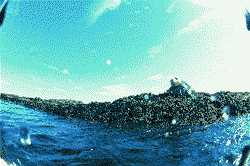|
Indeed, it was later on that year that the 'tuna wars' broke out. Naval boats were deployed into the Bay of Biscay to put a halt to the fighting which broke out between Spanish pole and line vessels and French, English and Irish drift-netters. Though the Spanish fleet is by far the largest in the North-East Atlantic, the pole and line technique that it employs (essentially involving the use of baited lines to catch individual fish) is a much more sustainable method of fishing than the use of drift nets. Reportedly incensed by the systematic abuse of the 2.5km limit by French, British and Irish fleets, Spanish crews attacked vessels from these countries, sabotaging any nets that they believed to be illegal. Some Spanish claims were in fact verified, after the confiscation of gear by naval boats from various drift-netting vessels.
One of the factors that sparked this series of confrontations was the British introduction of 'dolphin doors', which meant that the overall length of the British nets extended beyond the 2.5km limit. The doors are typically gaps of about 10m long, inserted between panels of drift net to provide a supposed escape route for dolphins. However, there is no scientific evidence to demonstrate that dolphins (or other wildlife) can detect them.
After the tuna wars, the European Parliament was called upon to vote on the Commission's proposal for a total ban on drift-nets. The Parliament in fact went a step further, proposing that the ban be implemented by the end of 1994. To curb political wrangling over small coastal drift-net fisheries, it suggested that the ban be specifically targeted at high seas drift nets.
Since the introduction of these very practical recommendations, back in 1994, the Council of Fisheries Ministers have repeatedly avoided taking a decision on the future of drift nets, preferring to sweep the issue under the carpet. In the meantime, their unwillingness to upset the political applecart has led to further deaths of an estimated 29-30,000 dolphins and literally millions of sharks.
This year, however, a light has appeared at the end of the proverbial tunnel, in the form of the UK's new Labour government. A pre-election promise to take environmental matters more seriously has, in this case at least, come to fruition. In the past, the UK has been one of the countries actively blocking the decision to ban drift nets in Europe. Now the new government has promised to support the ban and has requested that a vote is taken on the subject during the UK's presidency of the EU this year.
With only the French and Irish remaining openly opposed to the move, the UK's change of heart should be enough to gain a majority vote in favour of a European ban. Fishermen involved in the industry would then be compensated for any loss of earnings, with funds allocated for the conversion of drift-net vessels to other methods of fishing.
The vote is finally set to take place this month, more than five years after the initial UN moratorium on drift nets. There is still no guarantee that the issue will be resolved at this point. If a ban is agreed upon, we must ensure that it is properly enforced and that the newly redundant European drift nets do not resurface in other parts of the world.
The drift-net issue is merely the tip of the iceberg in the debate over the management of Europe's fisheries. Scientific evidence has pointed to the fact that many fish stocks in European waters are dwindling, some at an alarming rate. Populations of
marine mammals such as the harbour porpoise have
also been found to be declining - again, the likely
cause being bycatch in fishing nets. It is time that
the EU faced up to its responsibilities as a resource
manager. For all the talk of 'sustainable development',
little has been done to actually implement practical
management plans to achieve anything of the sort.
The marine environment is too important for
governments to use it as a mere pawn in their
political games.
If there is one lesson to be learned from the drift-net issue, it is that the pursuit of short-term economic gain continues to cloud attempts to secure the biological diversity on which the livelihoods of future generations depend.
|
